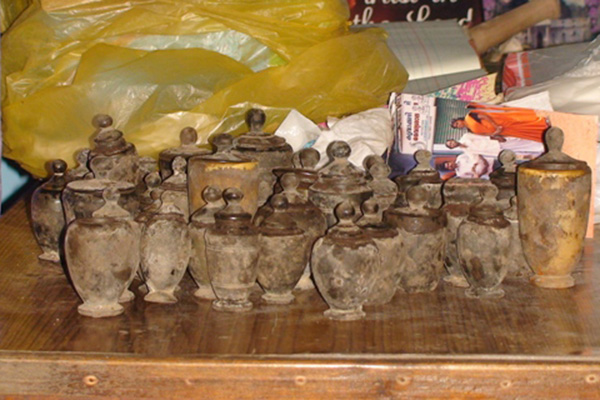Holistic Health
Promoting the Indigenous Medical systems
Based on ancient indigenous knowledge systems that take a holistic study of health focusing on physical, mental, social and spiritual well-being. Documentation, Conservation and promotion of the indigenous health systems of Siddha, Ayurveda and ethno medicine.
This involves:
- Identification of herbs and creation of Herbal gardens for various purposes
- Herbal Home Remedies
- Cultivation of Medicinal Plants
- Collection and Sale of Medicinal Plants through rural women SHGs, farmers, NGOs, students and other faculties
- Manufacturing of the Healthcare Products through rural women SHGs
- Documentation and creating awareness on indigenous medicine
- Conducting mass free herbal health care camps and workshops
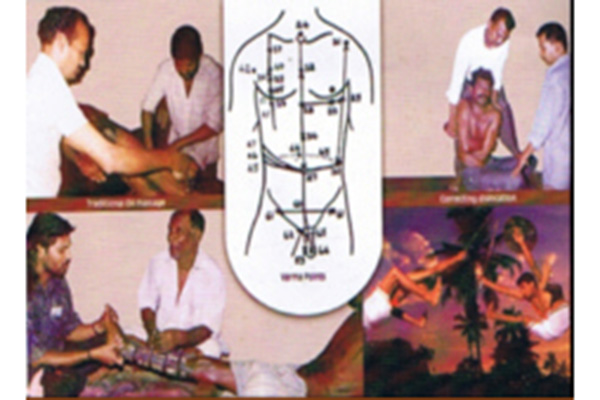
Holistic Health
Indigenous and effective siddha system of Marma/Varma which is indigenous and well flourishing in South Tamil Nadu has been for the first time studied effectively in the very first National Conference on the therapeutic dimensions of Marma/Varma system organized by VK - nardep.
Green Health camps are regularly conducted and also free herbal health camps are conducted in the villages. Herbal nurseries are installed in rural households and home herbal gardens are being installed in every house of the villages.
Awareness Programs & Workshops
Vivekananda Kendra-nardep conducts regular workshops on Siddha-Varma treatment for various illness including bone setting treatment. We also conduct workshops on traditional Visha Vaidyas treatment, Karappan (Skin Diseases), Neerilivu (Diabetes), herbal related programs and Siddha traditional medical basic fundamentals. Regular green health camps are also conducted at community centers. These are done to increase awareness among the public as well as medical community about the need to preserve, revive and validate the local indigenous systems of medicines.
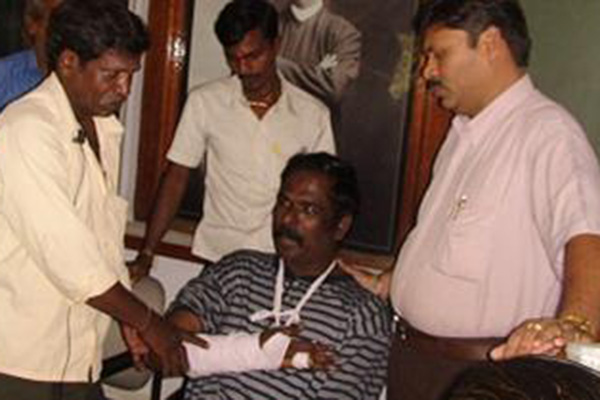
Awareness Programs & Workshops
Green Health Home
Green Health Home (GHH) functions at the Vivekanandapuram campus and treats patients through the Siddha system of medicine. Dr. V Ganapathy attends the patients twice a week and provides medical consultation and counseling. 80 percent of the medicines are self-prepared in the GHH itself. Rural women SHGs associated with VK-nardep also prepare herbal medicines.
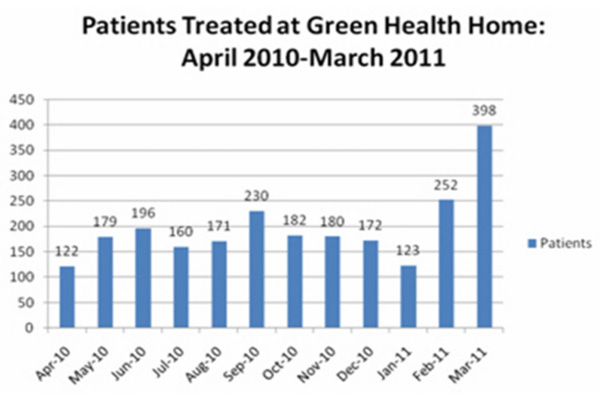
Green Health Home 1
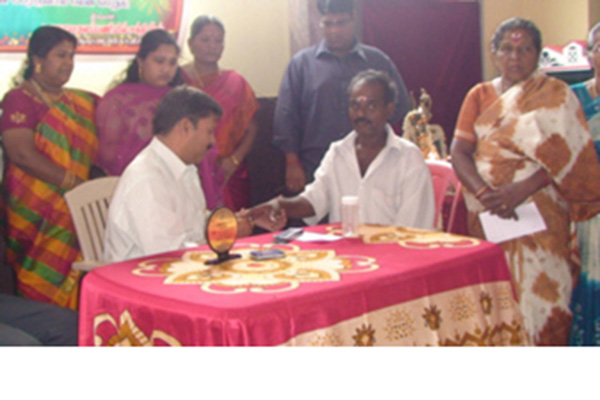
Green Health Home 2
Technology
Indigenous medical systems offer a variety of technologies for diagnosis, treatment as well as curing of various diseases. This also includes method of medicine preparation and special therapies. Here we provide a sample of those technologies which actually form a very broad spectrum.
Siddha Bone Fracture Treatment
VK-nardep works in the field of documentation, clinical application, awareness creation and standardization of selected tradition orthopedic Varma practices in the southern districts of Tamil Nadu.Though many of the traditional Varma medical healers treat a number of complicated orthopedic cases successfully, their methods have not been studied.
The success-failure rates of their results also have not been documented. This work by VK-nardep involves the collection of Varma literature for selective bone fractures and documentation of the treatment cycle of selected Varma practitioners in the two southern districts of Tamil Nadu namely Kanyakumari and Thirunelveli. Emphasis is given for chronic joint pains, degenerative disorders particularly for cervical & lumbar spondylitis and vertebral dislocations. Varma based Bone setting techniques and healing for joint dislocations are given specific consideration by VK-nardep.Ultimate aim of VK-nardep is creating community assets in the form of trained physicians, conservation of local indigenous knowledge base and improved cost-effective health systems.
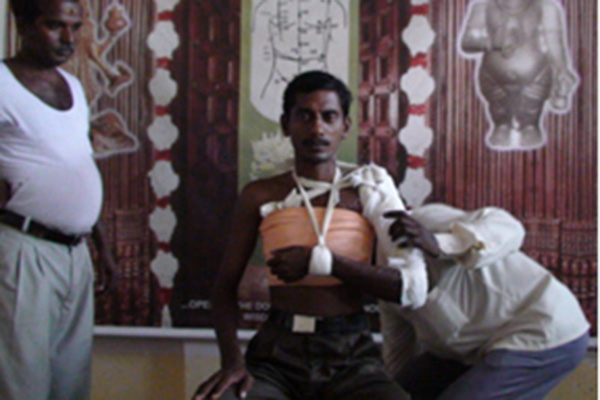
Siddha Bone Fracture Treatment
Diagnostics
It has been estimated by the World Health Organisation that the prevalence of diabetes in the developing world will increase by 48% by the year 2025 2, which will equate to an actual increase of 170% in the number of diabetes sufferers. By 2025, over 75% of diabetes cases will be in the developing world. India has the highest prevalence of diabetes in the world (32 million expected to increase to 78 million by 2030 according to WHO estimate) , accounting for almost one sixth of the world’s diabetic patients. Asian Indians are genetically predisposed to insulin resistance and because of this, in conjunction with a more sedentary lifestyle, higher total and saturated fat consumption and a higher intake of cholesterol and refined carbohydrates, they are at a high risk of developing diabetes.
Recent studies have shown that for every person known to have diabetes, there are more than two persons who have diabetes but are unaware of it.
So VK-nardep has taken up the study of the ancient medical literature on diagnostics of diseases using urinary analysis – particularly with reference to diabetes. It also studies cost-effective traditional methods of diagnosis through urine analysis for diabetes. It is working on Creating scientifically rigourous standardization of the procedure and accessory documentation for accompanying the standardized tests for diagnosis of diabetes.Ultimate aim here is to create a domestic medical analysis tool kit to test for diabetes.
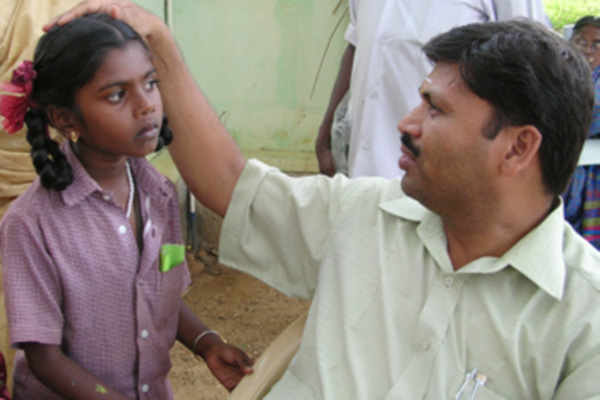
Diagnostics
Visha Vaidyas
Of the different indigenous systems of medicines in India Siddha and Ayurveda are two important and major systems. They have very efficient and cost-effective solutions for many ailments. One such is the venom bites and poison intakes. Venom is an organic substance from another living organism – usually protein- which when injected into human body through bite or sting, can cause various ill effects, from pain to death. Poisons are usually inorganic in nature and injurious to health on intake. In a tropical country like India which is dependent on agriculture, venomous bites particularly from snakes are common phenomena. Further there are other creatures –from centipedes to scorpions and not to speak of monkeys and rabid dogs. In such a situation the treatment for venom should be easily accessible and cost effective and also de-centralized.
Dr. V.Ganapathy and his team from VK-nardep exactly discovered that. There is a network of traditional healers, physicians and varied forms of venom treatment in rural communities of medicinemen. The team investigated and collected a rich amount of material based on the observation of individual practices, palm-leaves based manuscripts, embedded knowledge in traditional communities etc. They also discovered varied forms of treatment that showed great regional and contextual variety. With the help of AYUSH, Dr.Ganapathy and his team have collected this wealth of information and have discovered that these informal, decentralized and cost-effective medical networks built by ages, are fast getting destroyed because of various factors. VK-nardep has documented various techniques and cost-effective treatments that can be carried out in case of a venomous bite or poison intake.
